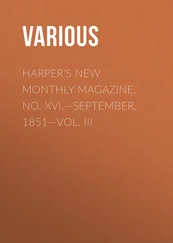Various - Harper's New Monthly Magazine, No. IX.—February, 1851.—Vol. II.
Здесь есть возможность читать онлайн «Various - Harper's New Monthly Magazine, No. IX.—February, 1851.—Vol. II.» — ознакомительный отрывок электронной книги совершенно бесплатно, а после прочтения отрывка купить полную версию. В некоторых случаях можно слушать аудио, скачать через торрент в формате fb2 и присутствует краткое содержание. Издательство: Иностранный паблик, Жанр: periodic, foreign_edu, на английском языке. Описание произведения, (предисловие) а так же отзывы посетителей доступны на портале библиотеки ЛибКат.
- Название:Harper's New Monthly Magazine, No. IX.—February, 1851.—Vol. II.
- Автор:
- Издательство:Иностранный паблик
- Жанр:
- Год:неизвестен
- ISBN:нет данных
- Рейтинг книги:4 / 5. Голосов: 1
-
Избранное:Добавить в избранное
- Отзывы:
-
Ваша оценка:
- 80
- 1
- 2
- 3
- 4
- 5
Harper's New Monthly Magazine, No. IX.—February, 1851.—Vol. II.: краткое содержание, описание и аннотация
Предлагаем к чтению аннотацию, описание, краткое содержание или предисловие (зависит от того, что написал сам автор книги «Harper's New Monthly Magazine, No. IX.—February, 1851.—Vol. II.»). Если вы не нашли необходимую информацию о книге — напишите в комментариях, мы постараемся отыскать её.
Harper's New Monthly Magazine, No. IX.—February, 1851.—Vol. II. — читать онлайн ознакомительный отрывок
Ниже представлен текст книги, разбитый по страницам. Система сохранения места последней прочитанной страницы, позволяет с удобством читать онлайн бесплатно книгу «Harper's New Monthly Magazine, No. IX.—February, 1851.—Vol. II.», без необходимости каждый раз заново искать на чём Вы остановились. Поставьте закладку, и сможете в любой момент перейти на страницу, на которой закончили чтение.
Интервал:
Закладка:
Meantime, our campaigning continued to rage. Overtures of pacification were never mentioned on either side. And I, for my part, with the passions only of peace at my heart, did the works of war faithfully, and with distinction. I presume so, at least, from the results. For, though I was continually falling into treason, without exactly knowing how I got into it, or how I got out of it, and , although my brother sometimes assured me that he could, in strict justice, have me hanged on the first tree we passed, to which my very prosaic answer had been, that of trees there were none in Oxford-street – [which, in imitation of Von Troil's famous chapter on the snakes of Lapland, the reader may accept, if he pleases, as a complete course of lectures on the natural history of Oxford-street] – nevertheless, by steady steps, I continued to ascend in the service; and, I am sure, it will gratify the reader to hear, that, very soon after my eighth birthday, I was promoted to the rank of major-general. Over this sunshine, however, soon swept a train of clouds. Three times I was taken prisoner; and with different results. The first time I was carried to the rear, and not molested in any way. Finding myself thus ignominiously neglected, I watched my opportunity; and, by making a wide circuit, without further accident, effected my escape. In the next case, a brief council was held over me: but I was not allowed to hear the deliberations; the result only being communicated to me – which result consisted in a message not very complimentary to my brother, and a small present of kicks to myself. This present was paid down without any discount, by means of a general subscription among the party surrounding me – that party, luckily, not being very numerous; besides which, I must, in honesty, acknowledge myself, generally speaking, indebted to their forbearance. They were not disposed to be too hard upon me. But, at the same time, they clearly did not think it right that I should escape altogether from tasting the calamities of war. And, as the arithmetic of the case seemed to be, how many legs, so many kicks, this translated the estimate of my guilt from the public jurisdiction, to that of the individual, sometimes capricious and harsh, and carrying out the public award by means of legs that ranged through all gradations of weight and agility. One kick differed exceedingly from another kick in dynamic value: and, in some cases, this difference was so distressingly conspicuous, and seemed so little in harmony with the prevailing hospitality of the evening, that one suspected special malice, unworthy, I conceive of all generous soldiership. Not impossibly, as it struck me on reflection, the spiteful individual might have a theory: he might conceive that, if a catholic chancery decree went forth, restoring to every man the things which truly belonged to him – your things to you, Cæsar's to Cæsar, mine to me – in that case, a particular brickbat fitting, as neatly as if it had been bespoke, to a contusion upon the calf of his own right leg, would be discovered making its way back into my great-coat pockets. Well, it might be so. Such things are possible under any system of physics. But this all rests upon a blind assumption as to the fact. Is a man to be kicked upon hypothesis? That is what Lord Bacon would have set his face against. However, some of my new acquaintances evidently cared as little for Lord Bacon as for me; and regulated their kicks upon principles incomprehensible to me. These contributors excepted, whose articles were unjustifiably heavy, the rest of the subscribers were so considerate, that I looked upon them as friends in disguise.
On returning to our own frontiers, I had an opportunity of displaying my exemplary greenness. That message to my brother, with all its virus of insolence, I repeated as faithfully for the spirit, and as literally for the expressions, as my memory allowed me to do: and in that troublesome effort, simpleton that I was, fancied myself exhibiting a soldier's loyalty to his commanding officer. My brother thought otherwise: he was more angry with me than with the enemy. I ought, he said, to have refused all participation in such sansculottes' insolence; to carry it was to acknowledge it as fit to be carried. "Speak civilly to my general," I ought to have told them; "or else get a pigeon to carry your message – if you happen to have any pigeon that knows how to conduct himself like a gentleman among gentlemen." What could they have done to me, said my brother, on account of my recusancy? What monstrous punishments was I dreaming of, from the days of giants and ogres? "At the very worst, they could only have crucified me with the head downward, or impaled me, or inflicted the death by priné , 4 4 Priné – πρινή, the Greek word for a saw . The saw was applied to the chest, and the man was sawed into two halves, leaving a sculptor's bust (man's head and shoulders) for the upper half.
or anointed me with honey (a Jewish punishment), leaving me (still alive) to the tender mercies of wasps and hornets." One grows wiser every day; and on this particular day I made a resolution that, if again made prisoner, I would bring no more "jaw" from the Philistines. For it was very unlikely that he, whom I heard solemnly refusing to take "jaw" from whole provinces of England, would take it from the rabble of a cotton factory. If these people would send "jaw," and insisted upon their right to send it, I settled that, henceforward, it must go through the post-office.
But, in that case, had I not reason to apprehend being sawed in two? I saw no indispensable alternative of that see-saw nature. For there must be two parties – a party to saw, and a party to be sawed. And neither party has a chance of moving an inch in the business without a saw. Now, if neither of the parties will pay for the saw, then it is as good as any one conundrum in Euclid, that nobody can be sawed. For that man must be a top-sawyer, indeed, that can keep the business afloat without a saw. But, with or without the sanction of Euclid, I came to the resolution of never more carrying what is improperly called "chaff," but, by people of refinement, is called "jaw" – that is to say, this was my resolution, in the event of my being again made prisoner; an event which heartily I hoped might never happen. It did happen, however, and very soon. Again, that is, for the third time, I was made prisoner; and this time I managed ill indeed; I did make a mess of it; for I displeased the commander-in-chief in a way that he could not forget.
In my former captures, there had been nothing special or worthy of commemoration in the circumstances. Neither was there in this, 5 5 From the naked character of the whole area on each side of the Oxford-road, at that time, there was very little opening for ambuscades. What little there was, which greatly fascinated my brother as one of the features connecting his own strategies with those of Cæsar, lay exclusively among the brick-kilns. Of these, there were numbers on the clay-fields adjacent to the road: and sometimes having been irregularly quarried (so to speak), they opened into lanes and closets, which offered facilities for momentary concealment. But the advantages almost ceased to be such from their obviousness, and the consequent jealousy with which they were watched and approached. The particular mode of my three captures was the constant mode of my danger; two or three parallel files advanced up the rising ground from the river; one or two of these by shouts, by more conspicuous activity, and by numerical superiority, succeeded in winning too exclusive an attention, while a slender thread of stragglers, noiseless, and apparently not acting in concert, suddenly converged when approaching the summit of the ascent, and instantly swept so rapidly round the left of my position, as in one moment to take away all chance of restoring the connection between myself and my brother; while, at the same time, by exposing too decisively for doubt the preconcerted plan on which they had really been moving, when most of all simulating the disarray of stragglers, they mortified us by the conviction that students of Cæsar's Commentaries might chance, notwithstanding, to show themselves most exemplary blockheads.
excepting that, by accident, in the second stage of the case, I was delivered over to the custody of young woman and girls; whereas the ordinary course would have thrown me upon the vigilant attentions (relieved from monotony by the experimental kicks) of boys. So far, the change was by very much for the better. I had a feeling myself – on first being presented to my new young mistresses – for to be a prisoner, I in my simplicity, believed, was to be a slave – of a distressing sort. Having always, or at least up to the completion of my sixth year, been a privileged pet, and almost, I might say, ranking among the sanctities of the household, with all its female sections, whether young or old (an advantage which I owed to a long illness, an ague, stretching over two entire years of my infancy), naturally I had learned to appreciate the indulgent tenderness of women; and my heart thrilled with love and gratitude, as often as they took me up into their arms and kissed me. Here it would have been as every where else; but, unfortunately, my introduction to these young women was in the very worst of characters. I had been taken in arms – in arms, against whom? and for what? Against their own nearest relations and connections – brothers, cousins, sweethearts; and on pretexts too frivolous to mention, if any at all. Neither was my offense of ancient date, so as to make it possible for desperate good nature to presume in me a change of heart, and a penitential horror of my past life. On the contrary, I had been taken but five minutes before, in the very act of showering brickbats on members of their own factory; and, if no great number of stones appeared to swell my pockets, it was not that I was engaged in any process of weaning myself from such fascinating missiles, but that I had liberally made over to their kinsfolk most of those which I possessed. If asked the question, it would be found that I should not myself deny the fact of being at war with their whole order. What was the meaning of that ? What was it to which war, and the assumption of warlike functions, pledged a man? It pledged him, in case of an opportunity arising, to storm his enemies; that is, in my own case, to storm the houses of these young factory girls; briefly, and in plain English, to murder them all; to cut the throats of every living creature by their firesides; to float the closets in which, possibly, three generations of their family might have been huddled together for shelter, with the gore of those respectable parties. Almost every book of history in the British Museum, counting up to many myriads of volumes would tell them plainly, and in pretty nearly the very same words, what they had to expect from every warrior, and therefore from me, videlicet this – that neither the guileless smiles of unoffending infancy, nor the gray hairs of the venerable patriarch sitting in the chimney corner; neither the sanctity of the matron, nor the loveliness of the youthful bride; no, nor the warlike self-devotion of the noble young man, fighting as the champion of altars and hearths; none of these searching appeals would reach my heart; neither sex nor age would confer any privilege with me; that I should put them all to the edge of the sword; that I should raze the very foundations of their old ancestral houses; having done which, I should probably plow up the ground with some bushels of Nantwich salt, mixed with bonedust from the graves of infants as a top-dressing; that, in fact, the custom of all warriors, and therefore by necessity of myself, was notoriously to make a wilderness, and to call it a pacification; with other bloody depositions in the same key, and often in the very same words.
Интервал:
Закладка:
Похожие книги на «Harper's New Monthly Magazine, No. IX.—February, 1851.—Vol. II.»
Представляем Вашему вниманию похожие книги на «Harper's New Monthly Magazine, No. IX.—February, 1851.—Vol. II.» списком для выбора. Мы отобрали схожую по названию и смыслу литературу в надежде предоставить читателям больше вариантов отыскать новые, интересные, ещё непрочитанные произведения.
Обсуждение, отзывы о книге «Harper's New Monthly Magazine, No. IX.—February, 1851.—Vol. II.» и просто собственные мнения читателей. Оставьте ваши комментарии, напишите, что Вы думаете о произведении, его смысле или главных героях. Укажите что конкретно понравилось, а что нет, и почему Вы так считаете.












